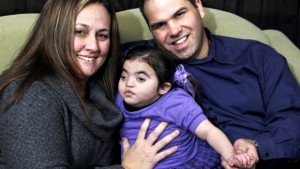Recently, local media covered the story of Amelia Rivera, a young girl with Wolf-Hirschhorn syndrome reportedly denied a kidney transplant by a local hospital. Amelia’s syndrome results in serious developmental delays, and according to her parents, the hospital declined a transplant due to her diminished mental ability and shortened lifespan.
It’s unwise to assume that news media get all the details of a story like this right, or that the motives of an entire hospital’s leadership and staff are as unfeeling as an individual doctor might seem. Nonetheless, a couple of things are worth noting. First, Amelia’s parents are persons who love their daughter zealously for who she is, and who know the beauty and dignity of her life despite her disability. Second, the habit of treating genetically disabled children as somehow less worthy of life is growing across the country.
A number of my friends have children with disabilities. Their problems range from cerebral palsy to Turner’s syndrome to Trisomy 18, which is extremely serious. Prenatal testing can now detect a high percentage of pregnancies with a risk of genetic problems.
The tests often aren’t conclusive. But they’re pretty good. And the results of those tests are brutally practical. Studies show that more than 80 percent of unborn babies diagnosed with Down syndrome, for example, now get terminated in the womb. They’re killed because of a flaw in one of their chromosomes – a flaw that’s neither fatal nor contagious, but merely undesirable.
The older a woman gets, the higher her risk of bearing a child with special needs. And so, in medical offices around the country, pregnant women now hear from doctors or genetic counselors that their baby has “an increased likelihood” of a genetic flaw based on one or more prenatal tests. Some doctors deliver this information with sensitivity and great support for the woman. But, as my friends know from experience, too many others seem more concerned about avoiding lawsuits, or managing costs, or even, in a few ugly cases, cleaning up the gene pool.
In practice, medical professionals can now steer an expectant mother toward abortion simply by hinting at a list of the child’s possible defects. And the most debased thing about that kind of pressure is that doctors know better than anyone else how vulnerable a woman can be in hearing potentially tragic news about her unborn baby.
I’m not suggesting that doctors should hold back vital knowledge from parents. Nor should they paint an implausibly upbeat picture of life with a child who has a disability. Facts and resources are crucial in helping adult persons prepare themselves for difficult challenges. But doctors, genetic counselors and medical school professors should have on staff – or at least on speed dial – experts of a different sort.
Parents of children with special needs, special education teachers and therapists, and pediatricians who have treated children with disabilities often have a hugely life-affirming perspective.
Unlike prenatal caregivers, these professionals have direct knowledge of persons with special needs. They know their potential. They’ve seen their accomplishments. They can testify to the benefits – often miraculous – of parental love and faith.
Expectant parents deserve to know that a child with special needs can love, laugh, learn, work, feel hope and excitement, make friends and create joy for others. These things are beautiful precisely because they transcend what we expect. They witness to the truth that every child with special needs has a value that matters eternally.
Raising a child with special needs can be demanding. It always involves some degree of suffering. Parents grow up very fast. None of my friends who has a daughter or son with a serious disability is melodramatic, or self-conscious, or even especially pious about it. They speak about their special child with an unsentimental realism.
It’s a realism flowing out of love – real love, the kind that forces its way through fear and suffering to a decision, finally, to surround the child with their heart and trust in the goodness of God. And that decision to trust, of course, demands not just real love, but also real courage.
The real choice in accepting or rejecting a child with special needs is never between some imaginary perfection or imperfection. None of us is perfect. No child is perfect. The real choice in accepting or rejecting a child with special needs is between love and unlove; between courage and cowardice; between trust and fear.
That’s the choice we face when it happens in our personal experience. And that’s the choice we face as a society in deciding which human lives we will treat as valuable, and which we will not.
January 22, marked the 39th anniversary of Roe v. Wade, the Supreme Court decision that legitimized permissive abortion around the country. More than 45 million abortions later, the damage of that decision continues to grow — undermining our reverence for the life not just of unborn children but of the mentally and physically disabled as well.
We need to understand that if some lives are regarded as unworthy, respect for all life is at risk. We should pray that Amelia Rivera gets the help she needs, and that God surrounds her parents with the support they need.
Now, more than ever, we should recommit ourselves to defending the dignity of all human life, no matter how “flawed” it may seem in the eyes of the world.
(Readers may wish to review the following hyperlinks related to the archbishop’s column this week:http://www.wolfhirschhorn.org/2012/01/amelia/brick-walls/ and http://articles.philly.com/2012-01-18/news/30639637_1_organ-transplants-potential-transplant-candidates-social-worker)
This article is reprinted with permission from www.catholicphilly.com




